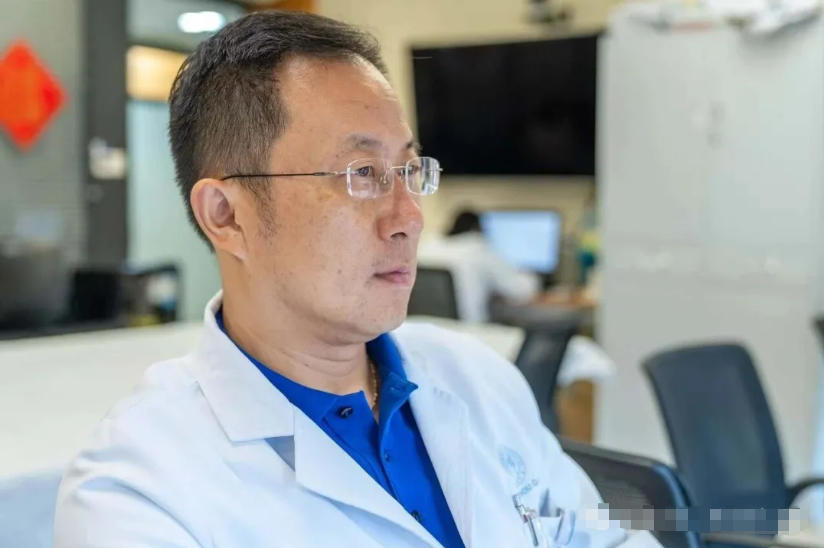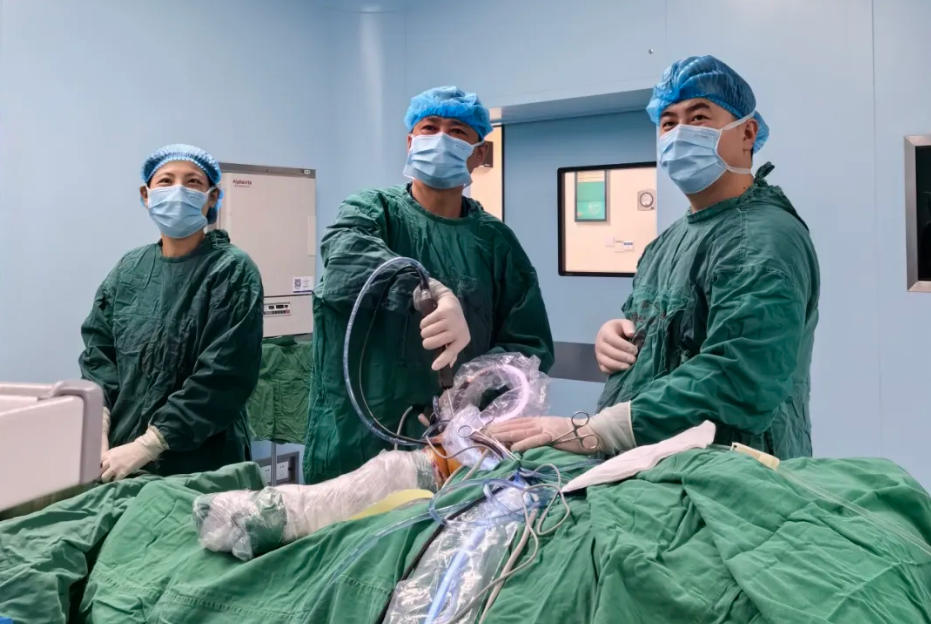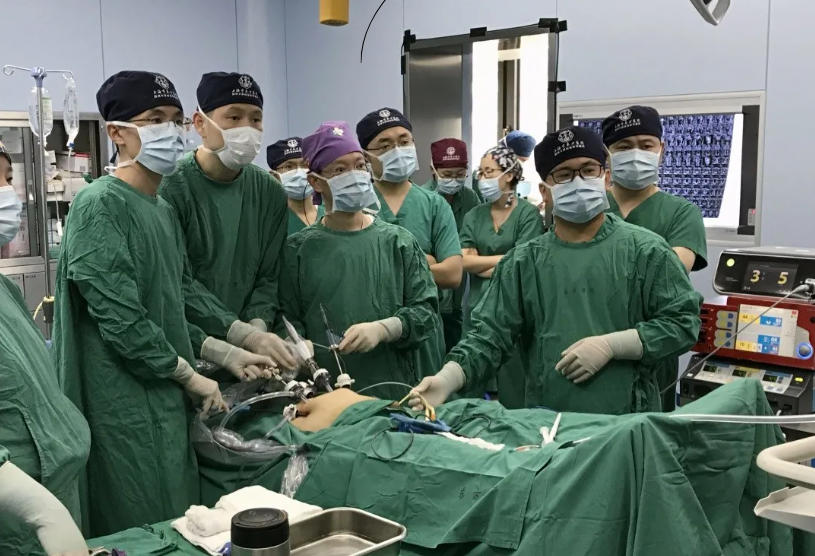Update time:2025-08-27Visits:6390

Dr. Ma Xiong: Professor of Gastroenterology and Director of the Department of Gastroenterology at Renji Hospital
Introduction
Dr. Ma Xiong exemplifies how dedication and perseverance can ignite meaningful change in medicine. As a healer, he has brought hope to countless patients through his expertise and compassionate care. His commitment to medical ethics and innovative research has established him as a leading figure in the field of gastroenterology.
Specializing in autoimmune liver diseases—a complex and challenging area of medicine—Dr. Ma remains at the forefront of global developments in the field. He continuously updates his knowledge and techniques, exploring new treatment approaches to improve patient outcomes.
What truly distinguishes Dr. Ma is his unwavering dedication to patient welfare. Regardless of how rare or complicated a case may be, he consistently upholds patient dignity and health through his exceptional medical skills and meticulous attention to detail.
The Medical Journey
During his childhood, hospitals became a second home to Ma Xiong, who frequently suffered from bronchitis. These early experiences shaped his perception of medicine, as he observed busy doctors caring for patiently waiting patients. He vividly recalls the relief he felt after receiving treatment and seeing his condition improve. These experiences instilled in the young Ma a profound admiration for the healing profession and its power to transform lives.
Determined to become a physician, Ma chose medicine without hesitation after completing high school, earning admission to the Medical College of Jiangsu University. Medical school proved demanding, requiring tremendous dedication to master the extensive knowledge and skills. Despite the rigorous academic pressures, Ma remained motivated by what he describes as “a sense of mission to heal lives.” Each academic achievement brought him deep satisfaction and reinforced his career choice.
Upon graduating, Ma began his medical practice at Zhenjiang First People’s Hospital. Founded in 1922 as a Christian institution, this hospital boasts a century-long legacy of excellence. During the Republic of China period, Zhenjiang served as the capital of Jiangsu Province, attracting distinguished medical resources that contributed to the hospital’s development. Today, Zhenjiang First People’s Hospital remains the premier comprehensive tertiary care center in the region.
At the recommendation of the hospital’s senior director, the newly graduated Ma joined the Department of Gastroenterology, where he quickly developed a strong passion for the specialty. He immersed himself in his work, providing patient-centered care with dedication and compassion.
During his four years at Zhenjiang First Hospital, Ma gained extensive clinical experience while developing his independent thinking and problem-solving abilities. He learned to integrate theory with practice, refining his diagnostic and treatment skills through careful observation and analysis. This period was crucial in shaping his distinctive clinical approach and methodology.
Recognizing that further education would enable him to help more patients, Ma applied to the prestigious Shanghai Institute of Digestive Disease for graduate studies. His excellent academic record earned him admission, where he met Professor Qiu Dekai, a pioneering scholar in liver disease research who would become one of his most influential mentors.
Professor Qiu, a trailblazer in China’s hepatology field, had made significant contributions to understanding alcoholic fatty liver, non-alcoholic fatty liver, and autoimmune liver diseases. As director of the Shanghai Institute of Digestive Disease, he provided Ma with invaluable guidance in researching chronic hepatitis, liver cirrhosis, and particularly autoimmune liver diseases.
Inspired by Professor Qiu’s foresight in recognizing the importance of autoimmune liver conditions—an area then largely overlooked in China—Ma chose this emerging field as his doctoral research focus in 1998, becoming one of the first Chinese scholars to specialize in this area.
“Professor Qiu Dekai is one of the mentors I admire most,” Ma reflects. “He was an elegant scholar who had a remarkable vision for both clinical practice and research. At a time when clinical medicine dominated the field, Professor Qiu recognized the importance of autoimmune liver diseases when few others were studying them. This pioneering work was especially crucial because we frequently encountered patients with unexplained abnormal liver function or what was then called ‘cryptogenic liver disease.’ Without a deeper understanding of these conditions, effective treatment was nearly impossible.”
Under Professor Qiu’s mentorship, Ma embarked on what would become a 25-year dedication to autoimmune liver diseases. Today, thanks to the progressive research led by Ma and his team, the underlying causes of many previously unexplained liver function abnormalities and the pathogenesis of cryptogenic liver disease have been uncovered.
“After years of dedicated effort,” Ma notes, “we have largely completed the etiological research on most cryptogenic liver diseases, achieving a much more comprehensive understanding of these conditions.”

Bridging Eastern and Western Medicine: A Career of Distinction
In 2005, Dr. Ma embarked on a significant chapter of his career at Johns Hopkins University, where he pursued postdoctoral research. During his two-year postdoctoral fellowship, Dr. Ma set a professional goal: to publish in the prestigious journal “Hepatology.” Through dedicated research and scholarly effort, he accomplished this objective, publishing two significant articles—one in “Hepatology” and another in the European “Journal of Hepatology.”
This international experience strengthened Dr. Ma’s resolve to return to China, where he envisioned leading a research team to advance hepatology in his home country.
“Although autoimmune liver diseases affect only about 0.05% of the population, China’s large population means this represents a substantial patient group that cannot be overlooked,” Dr. Ma explains. “Without early diagnosis and intervention, these conditions can progress to serious complications like liver cirrhosis. Early recognition and appropriate treatment significantly improve survival rates and quality of life. I felt compelled to return to China to make a difference for these patients.”
In 2006, while still in the United States, Dr. Ma collaborated with his mentor Professor Qiu Dekai to co-edit the first edition of “Autoimmune Liver Diseases: Basis and Clinical Practice.” This comprehensive work integrated the most advanced international research with clinical practices from Renji Hospital, reflecting the department’s innovative approach to the field.
Upon returning to China in 2007, Dr. Ma returned to Renji Hospital, where he intensified his focus on autoimmune liver diseases. He immersed himself in liver pathology, analyzing slides and engaging in detailed discussions with specialists in digestive pathology, including Professor Hu Xiqi. This collaborative approach allowed him to systematically organize and advance his research methodologies.
Despite his progress, Dr. Ma faced significant challenges in the practical aspects of autoimmune liver disease research.
“Detecting and identifying the relevant antibodies presented technical difficulties,” he notes. “Additionally, liver biopsy pathology posed challenges because pathology departments traditionally didn’t precisely classify inflammation patterns, viewing them as general conditions rather than distinct categories. For autoimmune liver disease research, however, precise pathological analysis and classification of liver inflammation are essential.”
Over time, Dr. Ma’s persistence contributed to major breakthroughs in liver pathology, and his team’s research findings have enabled many hospitals to implement systematic approaches to liver pathology analysis.
Dr. Ma’s growing international recognition led to his selection in 2012 as the only Chinese scholar in both the International Autoimmune Hepatitis Group and the Global Primary Biliary Cholangitis Group. As a key member of these organizations, he spearheaded the initiative to rename “Primary Biliary Cirrhosis” to “Primary Biliary Cholangitis”—a change that was widely adopted in the international hepatology community. He subsequently refined international diagnostic standards and treatment protocols, contributing to revisions of the Paris criteria. His recent subclinical research has addressed previously unexplored areas in the field.
In recognition of his exceptional contributions, Dr. Ma received the prestigious National Science Fund for Distinguished Young Scholars in 2013. This honor not only validated his work but also provided crucial funding that elevated his team to the forefront of international autoimmune liver disease research.
Dr. Ma’s leadership in establishing standardized care in China was further demonstrated in 2015 when he led the development of China’s first expert consensus on autoimmune hepatitis. Through teaching, lectures, and regular academic conferences, he has effectively disseminated knowledge about autoimmune liver disease diagnosis and treatment throughout China. He has since contributed to three additional consensus statements.
Reflecting on his work at Renji Hospital, Dr. Ma notes: “As one of China’s pioneering centers for autoimmune liver disease diagnosis and treatment, we attract patients nationwide. Over the past 23 years, more than 10,000 patients with autoimmune liver diseases have received timely diagnosis and effective treatment at our institution, including over 1,000 severe cases. Our treatment outcomes show remission rates exceeding 90%. Currently, our team treats more than 10,000 patients annually, with over 90% traveling from outside our immediate region. These achievements reflect the impact of our dedicated research over the years.”
Research-Driven Clinical Innovation
For Dr. Ma Xiong, 2011 marked a pivotal year. That year, Renji Hospital’s clinical research on autoimmune hepatitis gained widespread recognition.
“We led a national multicenter study that first validated the internationally proposed ‘comprehensive diagnostic scoring system’ and simplified its diagnostic application for autoimmune hepatitis. We found the simplified system’s accuracy exceeded 0.9, effectively meeting clinical needs. While the simplified criteria occasionally miss atypical cases, we use the comprehensive system to identify them. The comprehensive system also proves invaluable for clinical research. This work, published in the Journal of Hepatology in 2011, challenged the misconception among Western scholars that China only faced viral hepatitis, not autoimmune liver diseases.”
Soon after, Dr. Ma received an email from a renowned American professor—a pioneer in autoimmune hepatitis research who had long observed China’s progress in the field. Previously limited by scarce research in China, he now celebrated Dr. Ma’s breakthrough, which signaled China’s entry into the international autoimmune hepatitis community. The professor shared his research, recommended Dr. Ma for the International Autoimmune Hepatitis Group, and welcomed him as its first Chinese member.
“Our progress at Renji Hospital drew global attention to China’s autoimmune hepatitis research. Though we started later, our advancement has been rapid. A German professor who had visited China a decade earlier noted the shift: when he once discussed autoimmune hepatitis at conferences, no one engaged. Now, with China’s active research, he felt a renewed connection with the Chinese medical community.”
For Dr. Ma, breakthroughs in basic research alleviate suffering for patient groups, while clinical care addresses individual pain. Both are vital.
“Research-focused clinicians typically balance research and patient care—ideally splitting time equally or dedicating one-third to clinics and two-thirds to labs. Yet as clinical demands grow, so does the pressure.”
As Dr. Ma’s reputation spread, patients nationwide sought his expertise. Half-day clinics often stretched into full-day marathons. To advance research without turning patients away, he burned the midnight oil, dedicating nights to projects. Through relentless effort, he aimed to transform autoimmune liver disease treatment and research, enhancing patients’ quality of life and longevity.
Racing Against Time, Building a Team
Team building is the cornerstone of any department’s sustainable growth. In Dr. Ma’s team, mentorship blends guidance with camaraderie. He fosters curiosity and critical thinking, inviting students to debate research directions before decisions are made. These dialogues spark innovation, invigorating their work.
Today, Dr. Ma mentors 40–50 graduate students across diverse projects. He emphasizes daily communication, believing deep discussions fuel new ideas.
“Innovation thrives on intellectual collision, so everyone in our department participates in these exchanges.”
Dr. Ma’s teaching excellence is evident: two students recently won Shanghai Jiao Tong University’s Excellent Doctoral Dissertation Award, with two others nominated. He also guides top talent in the university’s “Zhiyuan Plan.”
“In this information age, my students are exceptionally sharp, with broad knowledge bases and mastery of new methodologies.”
As research evolved, Dr. Ma observed a shift: earlier generations identified targets through literature reviews, while today’s students leverage high-throughput analysis for comprehensive, evidence-based target discovery.
“The next generation always surpasses us, identifying research targets with greater speed and precision.”
He encourages students to become “research-driven clinicians” by integrating clinic work, lab research, and scientific inquiry. He urges them to question experiments and translate findings back to patient care. His model—prioritizing scientific inquiry over funding—proves replicable and effective.
Dr. Ma often reminds students that research demands patience and persistence. True achievement requires relentless effort.
“Scholarship requires the fortitude to endure long, solitary work—every word must carry weight.”
As a leading team in immune liver disease research, Dr. Ma’s group now ranks among the world’s top five.
“We push the boundaries of autoimmune liver disease innovation, relentlessly pursuing new therapies to improve patients’ lives.”

Holding Two Positions, Fighting Infection
During the pandemic, Dr. Ma assumed leadership of Renji Hospital’s Department of Infectious Diseases.
Liver diseases and infections are intrinsically linked, much of infectious disease work involving hepatic conditions. Pudong New Area prioritized infectious medicine, funding Renji Hospital’s new Infectious Disease Building—completed just before the pandemic erupted. As Shanghai braced for COVID-19, Dr. Ma took the helm. With the team understaffed and systems untested, compounded by the crisis, challenges mounted.
“Initially, we had only one head nurse. As the pandemic escalated, leadership fast-tracked our department’s expansion to admit COVID-19 patients. Wards occupied floors 2–4, with floor 5 as staff quarters. Amid the outbreak, we faced immense pressure managing and transferring patients. As cases surged, our South Campus joined the effort. I lived in the conference room; floor 5 became a refuge for stranded staff. This period tested our expertise and resilience—but we persevered.”
To bridge infectious diseases and hepatology, Dr. Ma co-founded the “Shanghai Complex Liver Disease Club.”
“We united infectious disease specialists, CDC experts, and physicians nationwide. Professor Zhang Wenhong and I serve as conveners. Now in its eighth year, the club thrives.”
Initially focused on challenging cases, the club hosted monthly in-person discussions. Experts dissected intricate liver and infectious disease cases.
“Complex case discussions are exhilarating. This platform lets clinicians share diagnostic and therapeutic challenges, brainstorm solutions, and tackle perplexing cases head-on.”
Today, the club’s reputation attracts thousands of online participants per session, energized by collective curiosity.
“Virtual access enables global participation. Recordings allow flexible learning, breaking traditional barriers. Our discussions are open and dynamic, fostering creativity.”
This environment empowers doctors to challenge conventions and pioneer solutions. Participants leverage diverse expertise, exploring liver diseases alongside related fields like gastroenterology and immunology.
“As the club’s influence grows, members report collective progress in medical standards. Sharing knowledge directly benefits patient recovery.”
To commemorate eight years of achievements, Dr. Ma and Professor Zhang co-authored Shanghai Complex Liver Disease Club: Pathology Selection and Clinical Thinking, compiling key cases and insights.
“One goal is democratizing access to these discussions.”
Dr. Ma’s successes stem from a core motivation: the fulfillment of alleviating patients’ suffering.
Daily, he treats severe cases—jaundice, decompensated cirrhosis, ascites—often reversing conditions within years, eliminating the need for transplants and restoring hope.
“Seeing patients recover after three years fills me with joy. Our team’s incremental progress will soon bear fruit.”
Editor:
Chen Qing @ ShanghaiDoctor.cn
If you'd like to contact to Dr. Ma, please be free to contact the email of Chenqing@ShanghaiDoctor.cn.
Note: Chinese Sources from “The Path of Benevolent Medicine” which was published in 2024. It records 90 important medical figures in the history of Renji Hospital. Yewen Renyi (ShanghaiDoctor.cn) team was one of the major writers of the book and is authorized by Renji hospital to create English version on the website of ShanghaiDoctor.cn
Hospital: Renji Hospital, Shanghai Jiao Tong University School of Medicine
Dr. Zhou Qianjun | “Sculpting Life in the Chest” – A Portrait” – A Portrait
Dr. Cai Junfeng | Guarding Bone and Joint Health, Improving Quality of Life
Dr. Xu Xiaosheng|The Gentle Resilience of a Male Gynecologist
Dr. Shi Hongyu | A Cardiologist with Precision and Compassion
Dr. Zhang Guiyun|The Inspiring Path of a Lifesaving Physician
Dr. Chen Bin | Building the Future of ENT Surgery at Lingang,Shanghai
Prof. Zhang Baigen | The Oral History of China’s Vascular Surgery

Dr. Zhou Qianjun | “Sculpting Life in the Chest” – A Portrait” – A Portrait

Dr. Cai Junfeng | Guarding Bone and Joint Health, Improving Quality of Life

Dr. Cui Xingang | The Medical Dream of a Shanghai Urologist

Dr. Xu Xiaosheng|The Gentle Resilience of a Male Gynecologist

Dr. Shi Hongyu | A Cardiologist with Precision and Compassion

Dr. Zhang Guiyun|The Inspiring Path of a Lifesaving Physician

Dr. Jiang Hong | Bringing Hope to Vascular Frontiers

Dr. Huang Jia | A Journey of Healing "Breath"

Dr. Chen Bin | Building the Future of ENT Surgery at Lingang,Shanghai

Prof. Zhang Baigen | The Oral History of China’s Vascular Surgery